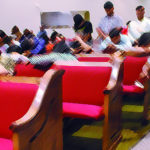BROWNWOOD—When clients arrive at Good Samaritan Ministries seeking food, clothing or school supplies for their children, some see no way out of poverty’s grip. Angelia Bostick gently encourages them to look around at the facility that houses the community ministry.
“It’s a testimony of transformation and what God can do,” said Bostick, founding executive director of Good Samaritan.
The 15,000-square-foot facility, just a few blocks off Main Street in downtown Brownwood, originally was three buildings separated by alleys. Over more than three-quarters of a century, the structures had housed a car-repair shop, a roller skating rink and a variety of businesses that flourished and floundered.
By the early 1990s, the abandoned buildings had fallen into disrepair. Good Samaritan secured the central 9,500-square-foot building for $200 a month, and then the ministry’s leaders purchased the surrounding property.
Thanks to a bequest from the estate of Suzanne Bacon—whose only contact with Good Samaritan was reading a newspaper article about the ministry—along with other gifts and a grant from USDA Rural Development, the three buildings were enclosed under one roof and totally renovated.
A chaplain thought of the ministry and its needs when he saw a load of discarded tiles at Carswell Naval Base and asked if Good Samaritan could have them. The mason who set the wall tiles at the Brownwood ministry marveled that he had the exact number needed to complete the job.
Bostick interprets that incident as a parable—an example of how what someone considered “junk” possessed value when placed in God’s hands. She uses that story—as well as other examples of denoted furnishings and decorations at the Good Samaritan facility—to teach subtle lessons about transformation to clients.
Most of the people who come to Good Samaritan receive that message gladly. Even though they may be working on Sundays and unable to attend church—or they may not feel altogether comfortable in church because they are embarrassed by their life situations—they recognize God as their only hope, she noted.
“Most of these people have a deep faith. The only way they can make it through the day is relying on God and his people,” she said.
Bostick, a member of Coggin Avenue Baptist Church in Brownwood, committed her life to vocational Christian service at age 17, but she struggled with how to fulfill what she believed was God’s calling. In 1991, she participated in a life-changing mission trip to Brazil. That’s when God gave her a passion for serving poor people, she said.
Sign up for our weekly edition and get all our headlines in your inbox on Thursdays
“In America, we can put blinders on and pretend poverty doesn’t exist. But in the Third World, you can’t avoid contact with poverty and human suffering. It touched my heart so deeply,” she said.
But rather than seek appointment to a foreign missions post, Bostick said, “God told me to go home and serve the poor.”
Consultants with the Baptist General Convention of Texas worked with the local association to conduct a community needs assessment of the Brownwood area.
Baptists in the area recognized the need for a comprehensive ministry that could draw support from churches of various denominations, and leaders invited Bostick to direct it.
“I agreed to do it until they could find somebody else,” she said, chuckling about the temporary assignment that has lasted 15 years with no end in sight.
Good Samaritan Ministries receives support from 38 churches—Baptist, Methodist, Disciples of Christ, Presbyterian, Lutheran, Church of the Nazarene, Assembly of God, Church of Christ, African Methodist Episcopal, Catholic and nondenominational.
Last year, volunteers from many of those churches logged more than 12,000 hours service at Good Samaritan.
The ministry provides food to about 600 families and 1,500 individuals a month. Texas Baptists help provide funding for Good Samaritan through gifts to the Texas Baptist Offering for World Hunger.
Good Samaritan purchases most the nonperishable food it distributes from the Food Bank of West Central Texas. In fact, the ministry is the food bank’s largest client in the 17 county-area it serves.
About one-third of the people in Brown County live in poverty, Bostick noted. The clientele at Good Samaritan reflects the ethnic make-up of the area—about three-fourths white, 18 percent Hispanic and 6 percent African-American.
About 15 percent of Good Samaritans’ clients are age 60 and older. Three-fourths of the families served are single parents—or widowed grandparents caring for grandchildren.
“We have a lot of elderly people on fixed incomes. Many are grandparents who are raising kids because the children’s parents are not around or able,” Bostick said. “Meth labs are a bad problem around here, and they are breaking up families.”
Two-thirds of the people who seek help at Good Samaritan fall into the age 20 to 60 bracket. “We serve a lot of the working poor—the underemployed,” Bostick noted.
Elderly and disabled people represent a majority of the “regulars” at Good Samaritan who depend on the ministry for ongoing needs, she added.
“The working poor, on average, come about once every three months—when things get tight,” Bostick said.
“These are good people—the salt of the earth. But they are faced with tough choices. ‘Do I eat, or do I pay a bill?’ That’s not a good place to be.”














We seek to connect God’s story and God’s people around the world. To learn more about God’s story, click here.
Send comments and feedback to Eric Black, our editor. For comments to be published, please specify “letter to the editor.” Maximum length for publication is 300 words.